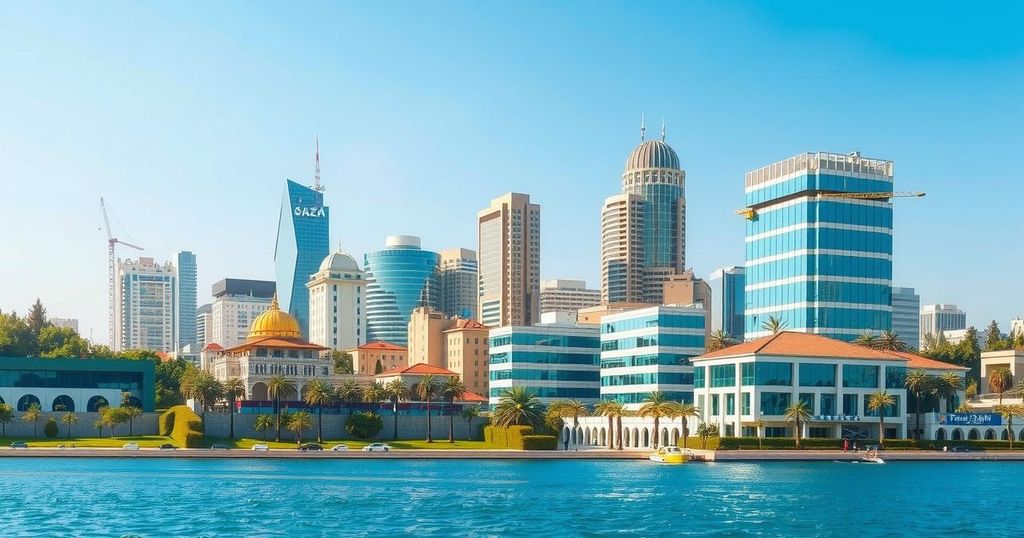Arab leaders have endorsed Egypt’s reconstruction plan for Gaza, allowing its current residents to remain, presenting a counterproposal to Trump’s resettlement plan. Egyptian President el-Sissi emphasized collaboration for a comprehensive resolution to the Palestinian issue. While the White House dismissed the plan as impractical, Hamas praised the Arab nations’ support for their cause in light of the ongoing humanitarian crisis.
On Tuesday, Arab leaders endorsed Egypt’s postwar reconstruction plan for Gaza, which allows its approximately 2 million Palestinian residents to remain, in contrast to U.S. President Donald Trump’s controversial proposal to resettle them. Egyptian President Abdel Fattah el-Sissi praised the consensus among Arab states, emphasizing the necessity for a just resolution to the Palestinian issue without displacement.
In a statement following the summit, President el-Sissi indicated his intention to collaborate with President Trump, Arab nations, and the international community to achieve a comprehensive settlement. He underscored that such a plan must address the underlying causes of the Israeli-Palestinian conflict while ensuring stability and security for the region.
The White House, however, dismissed Egypt’s proposal as impractical, with National Security Council spokesman Brian Hughes asserting that Gaza is currently uninhabitable. He reiterated President Trump’s commitment to creating a Gaza free from Hamas, emphasizing ongoing dialogues to promote peace.
Israel’s foreign ministry spokesperson, Oren Marmorstein, criticized the Egyptian plan for not acknowledging recent conflicts nor addressing the role of Hamas in the ongoing violence. He advocated for Trump’s vision of relocating Gaza’s population, describing it as a choice rooted in freedom.
Egypt’s Foreign Minister, Badr Abdelatty, condemned Israel’s position as unacceptable, insisting on the necessity of an independent Palestinian state as a precondition for regional peace. He highlighted Israel’s alleged violations of international law and stated that a single nation’s will should not dominate global affairs.
Hamas welcomed the Arab summit’s conclusions, viewing it as a reaffirmation of Arab solidarity with the Palestinian cause. They voiced their appreciation for efforts to prevent the forced relocation of Palestinians from Gaza and the West Bank.
Israel’s government has expressed support for an alternative U.S. proposal involving a ceasefire contingent on Hamas releasing hostages taken during the conflict. The ongoing blockade of essential supplies to Gaza has drawn widespread condemnation from human rights organizations, citing violations of international law.
Egypt’s reconstruction plan envisions rebuilding Gaza by 2030 without removing its current inhabitants, beginning with the clearance of explosive remnants and debris. The Arab League has called for the U.N. Security Council to deploy a peacekeeping force to the region, emphasizing that peace remains the strategic focus of Arab nations.
The details of Egypt’s plan include constructing temporary housing for those affected during the reconstruction, with a vision of sustainable urban development, renewable energy sources, and the establishment of significant infrastructure such as ports and airports. Hamas has agreed to cede power to a transitional administration to expedite the establishment of governance until a reformed Palestinian Authority can take over.
The conflict and humanitarian crisis have escalated dramatically since Hamas’s attack on October 7, which resulted in substantial casualties and a massive military response from Israel. The ongoing warfare has devastated infrastructure in Gaza, severely impacting health systems and displacing the majority of the population, creating a dire humanitarian situation requiring immediate international attention and aid.
The endorsement of Egypt’s reconstruction plan by Arab leaders represents a significant shift in the discourse surrounding Gaza, advocating for the continued presence of its Palestinian population. With concerns raised by both U.S. and Israeli officials, this initiative aims to foster stability and address humanitarian needs without resorting to displacement. The complex dynamics of the region necessitate careful negotiation and commitment from involved parties to reach a sustainable resolution to the ongoing conflict.
Original Source: www.washingtonpost.com






